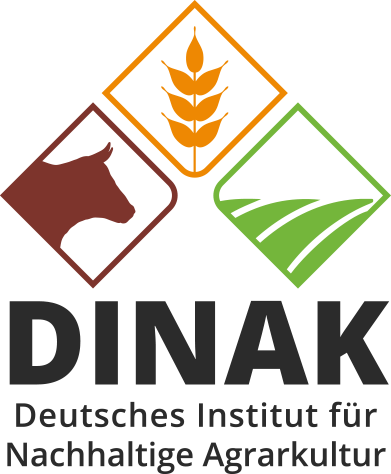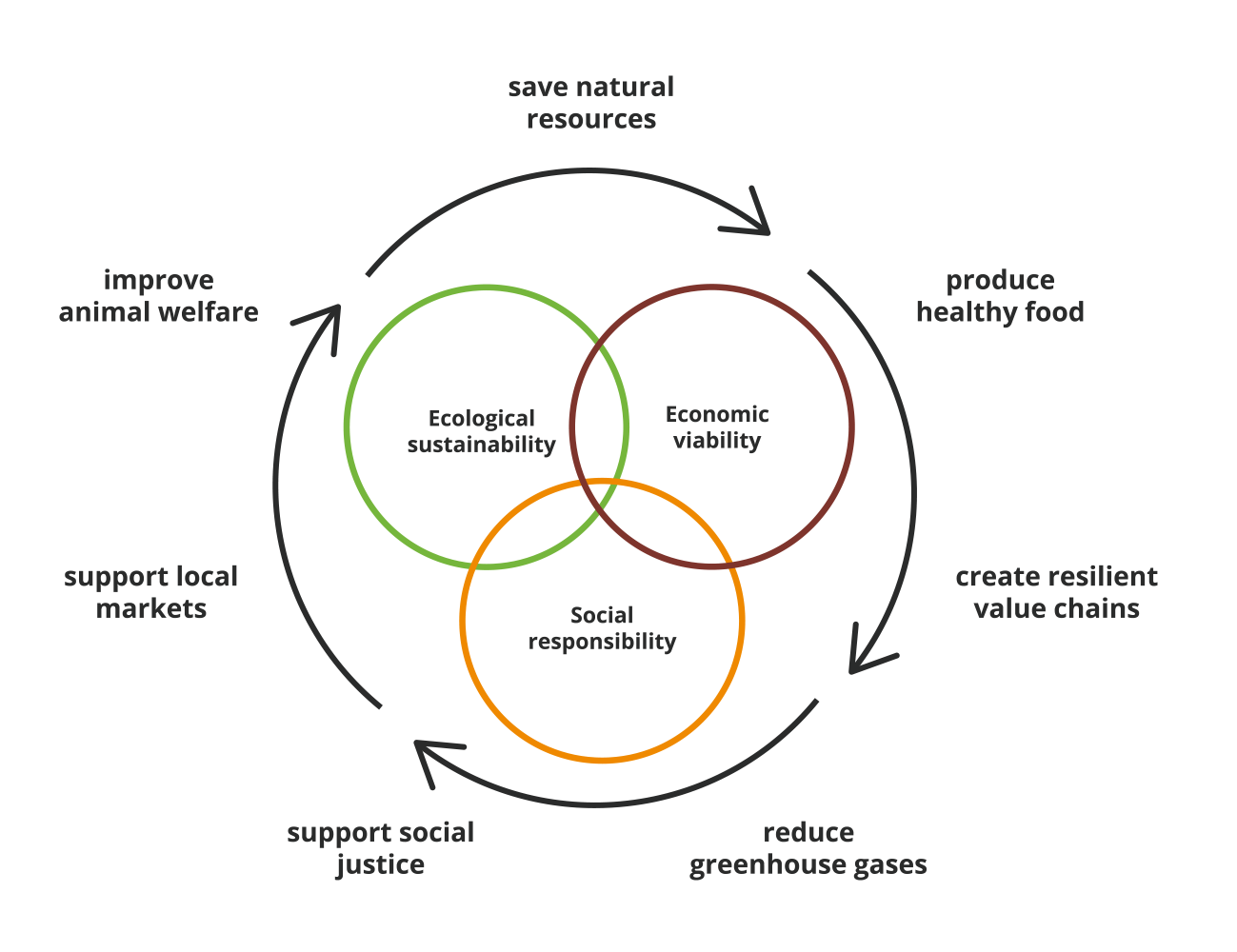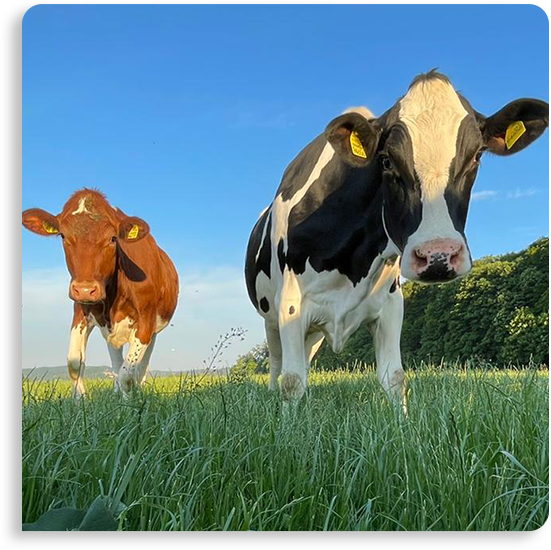Measuring sustainability in agriculture and making it visible
DINAK is a joint venture of:
Our criteria and indicator model is used for multiple and objective assessment of sustainability in agriculture. The core competence of DINAK – Deutsches Institut für nachhaltige Agrarkultur (German Institute for Sustainable Agricultural Culture) lies primarily in the application of meaningful indicators for the status-quo survey and optimization of sustainability performance of agricultural enterprises. We offer sustainability certificates, strategic consulting for farm optimization and support you on your way to more adaptability and transformability. Help shape your future, because what is measurable can be evaluated and changed in a targeted manner!
Why sustainability assessment in agriculture?
"Sustainability" is an important principle of action in agricultural, environmental and climate policy and is regarded as a guiding principle for a sustainable and resource-conserving way of doing business that is committed to animal welfare. Systems in which the regenerative capacity is preserved are described as "sustainable". It requires appropriate indicators that ecological, economic and social Describe effects. The assessment provides important information on where the company is already good and where the production system still has weaknesses. The results are used to communication in society used. They offer a possibility of product differentiation. More and more market partners of farms, be it banks or the processing industry, attach importance to dealing with their own operational sustainability.
Sample result of a sustainability assessment. The sustainable range is between 75 and 100%.
Our approach
We assess agricultural sustainability (ecology, economy, social issues, animal welfare) with objectively measurable, significant, and scientifically based indicators. In this context, a system is always considered in its entirety. Our target values and target areas are based on professional expertise and thus exclude environmental hazards or reduce them to a minimum and are economically and socially acceptable. The assessment considers the actual production process in detail. In crop production, for example, all measures carried out are considered: "When was which measure carried out, where, and with what?" This is the only way to adequately record and assess the status quo.
Our sustainable analyses are:
- objective
- scientific
- validated
- holistic
- company-specific
A total of around 30 ecological (including animal welfare), economic and social indicators are evaluated. First of all, a wide range of data from the farm is recorded, which mainly comes from the existing software systems and the documentation of the operational production process. This includes, for example, data from the field register, the accounting system including payroll accounting, the existing annual financial statements and the HIT database. The data is then checked for plausibility and offset against the algorithms for sustainability assessment. The result is summarized in a test report and handed over to the evaluated farm.
greenhouse gas balance
The CO2-Footprint is an important indicator from the environmental sustainability assessment. It makes the climate impact of the entire production or a selected product visible. On the way to achieving greenhouse gas neutrality by 2050, every actor must know the necessary adjustments to reduce the climate impact in their area. The CO2-Footprint shows in which areas of production on the farm relevant greenhouse gases are released and where the greatest potential for savings and efficiency measures is.
Knowing the greenhouse gas balance (GHG balance) of your own company means:
- Knowing your own set screws
- to save energy and resources efficiently
- to reduce operating costs sustainably
- to formulate reduction targets
- Establish climate management
- to commit to sustainability and to make this visible
Sustainability assessment
Step by step

1. You contact us
uns

2. We do the analysis and assessment

3. You get the certificate
our certificate
We award the DINAK seal for sustainable agriculture to farms and products that meet our standard of sustainability in agricultural production. Our seal is valid for a maximum period of 3 years. If you would like a close analysis of the success of your company's sustainability goals, we will carry out annual recertification and annual monitoring programs.
Press
- NDR: Neue Studie will nachhaltige Landwirtschaft untersuchen und bewerten (10/2022)
- SAT.1 Regional: Nachhaltige Landwirtschaft: Institut bewertet Milchviehbetrieb aus Horst (10/2022)
- mdr: Konventionelle Landwirtschaft soll mit Nachhaltigkeit punkten (05/2023)
- mdr: Warum konventionelle Landwirte in Sachsen-Anhalt auf mehr Nachhaltigkeit setzen (05/2023)
- TBV-Journal: Agrar GmbH Ziegelheim – Vorreiter in Sachen Nachhaltigkeit (02/2024)
Contact us
About us
DINAK is a consortium of IAK Agrar Consulting GmbH and INL – Privates Institut für Nachhaltige Landbewirtschaftung GmbH. IAK is responsible for the consortium's public relations work. It is also the contact for commissioning a DINAK sustainability assessment. The INL processes orders and continuously develops the DINAK sustainability assessment – especially concerning the ecological component.
IAK Agrar Consulting GmbH
IAK is an independent, agriculturally oriented consulting firm with more than 40 years of expertise on behalf of the public and private companies at home and abroad. As its core competence, IAK will undertake the sustainability assessment of economic and social indicators.
INL – Privates Institut für Nachhaltige
Landbewirtschaftung GmbH
INL is an independent engineering office based in Halle, which sees itself as a service provider between agriculture, environmental protection, trade, processors, science and politics. In doing so, we take care to apply not only neutrally, but independently, scientifically, innovatively and with the highest level of competence our know-how from two decades of experience in the evaluation of ecological sustainability.
 Contact us
Contact us









